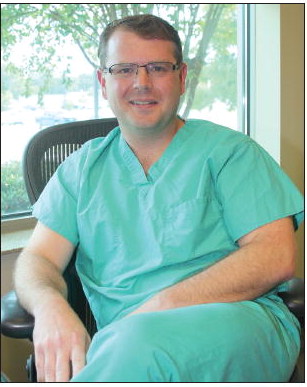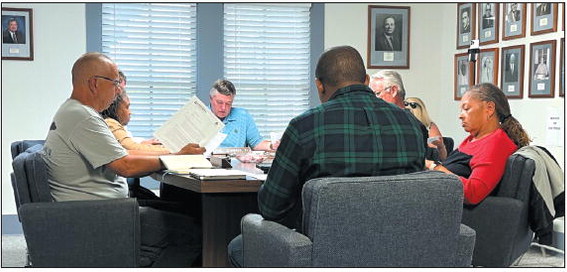Neurosurgeon Joins Meadows Medical Staff


With the addition of a neurosurgeon to its medical staff, Memorial Health Meadows Hospital is making history once again. Dr. Ryan Lingo, who is currently practicing at the Neurological Institute of Savannah and is affiliated with Memorial Health University Medical Center, is now visiting Vidalia on a biweekly basis to see patients and to perform surgery. Memorial Health and Meadows are regional healthcare partners through their parent company, HCA Healthcare.
Dr. Lingo, who is an expert in brain, skull base, spine and peripheral nerve surgery, including minimally invasive spine and cranial procedures, is Meadow’s first neurosurgeon. He has been performing surgery at Meadows since April and sees patients every other Wednesday at Meadows’ Lucy Pierson Building. Dr. Lingo graduated from Mercer University School of Medicine in 2012 and completed his neurosurgery residency at the University of Tennessee Health Science Center and the Semmes Murphy Clinic in Memphis, Tennessee. He is on the medical staffs of both Memorial Health and St. Joseph’s Hospital in Savannah.
A native of Columbus, Dr. Lingo and his family now live in Savannah. He said he welcomed to opportunity to practice in Vidalia because the city reminded him of the community where he grew up. “Obviously, it is a good market for health care providers to build a practice and the Meadows facilities are fantastic.“ continued from page
Dr. Lingo and Meadows CEO Matt Hasbrouck became acquainted when both of them worked at Memorial Health in Savannah. Hasbrouck, who introduced Dr. Lingo to the need for a neurosurgeon at Meadows, said, “It was great to connect with Dr. Lingo and expand our medical team. He has built a strong practice in South Georgia and is technically gifted and very personable.” Dr. Lingo said of his medical philosophy, “I am a surgeon by training, but not everybody needs surgery. I don’t cut first; I cut last.” He said there is a joke he tells his patients: “You go to Midas expecting a muffler. When you go to a neurosurgeon, you expect surgery.” He countered, “The likelihood is that you are going to get a recommendation for brain or spinal surgery, but the best treatment for a patient might not be surgery.”
He advocated listening to patients and hearing them out. “They have seen a lot of doctors before they see me, and I have to assume when they see me it is quite possibly the worst day of their life. Nobody goes to see neurosurgeon because they are having a good day.”
Dr. Lingo’s cases range from chronic to emergent— from degenerative and congenital conditions to injuries, tumors and hydrocephalus; but spinal issues account for 60% to 70% of his practice.
“Most of the surgery we do for back pain involve more than just back pain; they involve some sort of neurological symptom, such as nerve compression or spinal cord compression causing numbness. It is a misnomer to just say we treat back pain because we offer comprehensive care for the spine,” the doctor said. Degenerative spinal issues, which are very common, make up the bulk of the cases Dr. Lingo treats.
Dr. Lingo is the first physician in his family. He said he was always interested in science, which led to pursing a biology degree in college. “I was looking for something exciting, and I felt like medicine offered that.” After he got into medical school and witnessed brain surgery, he was “pulled in.” He met his future wife, Ashley Shearman, while at the University of Georgia in 2005. After graduating, they served their residency together in Tennessee and later moved back to Georgia. She is now a pediatrician practicing in Savannah. The couple has two daughters, Avery, two and a half years old, and Cameron, three and a half months old.
Considering why he gravitated to a dual subspecialty in cranial and spinal surgery, Dr. Lingo summarized, “It offered tremendous variety; obviously, there is a lot of difference between the two, but also a lot of techniques between the two that overlap. Each pose their own unique challenges, but being a good spinal surgeon can make you a better brain surgeon, and vice versa.”
He elaborated, “One of the beautiful things about the multi-disciplinary aspect of these subspecialties is working with other specialists like oncologists and radiation oncologists. Dr. Lingo participates in brain tumor conferences at Memorial Health once a month where neurologists and other specialists discuss their most complex cases.
CT and MRI technology are integral components in the kinds of surgery Dr. Lingo performs. “We use this technology almost like a GPS to navigate the precise placement of spinal instrumentation and for deep brain tumors.” He is excited about what is on the horizon for enhancing the effectiveness of spinal and brain surgery.
Academic level facilities like Memorial Health are investing in new technology to enhance neurooncological care. Memorial Health has purchased a cutting edge 3T MRI and in the planning stages to implement it in early 2023.
“Most MRIs are 1.5 Teslas. The 3T will enable surgeons to obtain more information about the patient’s brain during surgery,” Dr. Lingo explained. This means that surgeons, through inter-operative neurological monitoring, can localize and map specific areas of the brain in order to not only efficiently remove tumors but to avoid damaging areas of the brain responsible for language and movement. Last month, doctors at Memorial Health successfully performed the first “awake” brain procedure during which they constantly monitored the patient’s language abilities during the surgery. “Essentially, this technology allows us to do our job better, to take out more tumor and cause less harm. Now, instead of Instead of going to Emory or Mayo for this type of surgery, patients can go to Savannah,” Dr. Lingo said. The techniques Dr. Lingo brings to Meadows offer a minimally invasive approach with smaller incisions and quicker recovery.
“Just from the standpoint of being the first neurosurgeon to practice here, I believe my practice will offer a different technical approach to spinal pathologly and offer alternatives for patients with degenerative problems. It will open doors and make it easier for those with more common issues,” Dr. Lingo said.
For complex cases Dr. Lingo may not be able to treat locally, his practice will facilitate access to neurosurgical consultative services at Memorial Health. He emphasized that initial consultation and postoperative follow-ups can be handled in Vidalia. That is also the case for post-operative care in trauma cases.
Having a neurosurgical practice in Vidalia will increase the quality of care for residents, Dr. Lingo noted. “The longer a person has a particular health condition — and most are progressive — and the longer they wait for treatment, the more difficult they are to treat.”
Hasbrouck agreed. “ ‘Keeping care close to home’ has been my mantra since the day I got here. We have been striving at Meadows to offer the top core medical services with access to subspecialties. Having the opportunity to sync up with Dr. Lingo and the Tumor Board at Memorial Health will create a positive impact in this community.”







